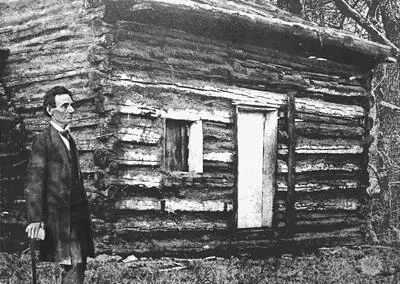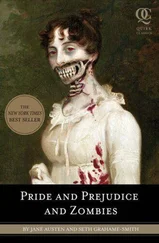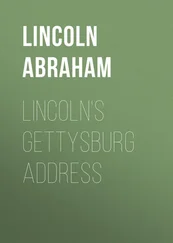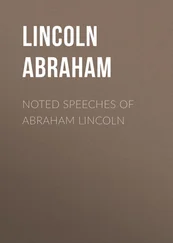He came for me next, standing over me as I lay helpless. He aimed the barrel of his revolver at my head. Our eyes met.
They were Henry’s eyes.
“Sic semper tyrann—”
The last word was cut off by the sound of the shot.
Abe awoke with a start.
He sat straight up in his bed and shielded his face with his hands, just as he had all those years ago, on the night he saw his father dealing with the devil. The night Jack Barts had condemned his mother to death.
Mary slept peacefully by his side. His boys were safely in their beds. A thorough check of the house turned up no evidence of trespassers—living or otherwise. Still, Abe would sleep no more that February night. There’d been something so familiar about the dream. So real. He could see every detail of the theater in his mind; every detail of the costumes and scenery. He could feel the nauseating pain of his leg, and hear Angelina’s blood running onto the floor. But try as he might, Abe couldn’t remember those three damned words that his murderer uttered just before he woke. *

Shortly after Abe’s dream, William Seward, still the heavy favorite to be the Republican presidential nominee in 1860, made a strange tactical decision:
Seward has abruptly left for a tour of Europe, and shall be gone these next six months at least. What can it mean on the eve of so crucial an election? How can such an absence be to his advantage? There are many who have criticized [the trip] as proof of his arrogance; his aloofness. I, however, am reluctant to levy such condemnation—for I suspect that he has been sent at the Union’s behest.
Abe’s suspicion was confirmed by Henry’s next letter.
Abraham,
Our friend S has been sent on an errand—one which we hope will shore up support for our cause in the coming months and years. We now ask that you turn your whole heart toward that greatest of political contests.
—H
In Seward’s absence, Abe’s political allies worked to shore up support for a presidential run, while Abe worked on raising his national awareness. On the evening of February 27th, 1860, at New York’s Cooper Institute, he delivered what some historians consider to be the greatest political speech of all time to an audience of more than a thousand.
“Neither let us be slandered from our duty by false accusations against us,” Abe shouted, “nor frightened from it by menaces of destruction to the Government nor of dungeons to ourselves. Let us have faith that right makes might, and in that faith, let us, to the end, dare to do our duty as we understand it.”
The full text ran in every major New York newspaper the next day, and within a couple of weeks, pamphlets containing “Lincoln’s Cooper Speech” were available throughout the North. Abe was emerging as the intellectual leader of the Republican Party, and its most gifted speaker.
The Democratic Party, meanwhile, had been split in two.
Northern Democrats nominated Abe’s old rival Stephen Douglas for president, while Southerners picked the incumbent vice president, John C. Breckenridge. The fracture was no accident. Rather, it was the result of a decades-long effort by the Union. Since the early nineteenth century, Henry and his allies had worked to undermine their enemies at every turn: ferrying slaves to the North on the Underground Railroad, dispatching spies across the South, and more recently, discouraging secessionist talk in state legislatures. But their greatest achievement came on May 18th, 1860, on the third ballot of the Republican National Convention in Chicago.
Abe was in Springfield when he learned that he, not Seward, had been nominated for president.
I can scarcely comprehend that such an honor has been bestowed upon me, and yet (and there is no hope of putting this modestly, so I shall not attempt to) it comes as no surprise. There is a war coming. It shall not be a war of man—but it is man who shall spill his blood fighting it—for it concerns his very right to be free. And I, of all men, must win it.
III
In 1860, presidential candidates weren’t expected to campaign on their own behalf. The speechmaking and handshaking were traditionally left to political allies and subordinates, while the candidates themselves remained behind the scenes, quietly writing letters and greeting well-wishers. Abe saw no reason to break with tradition. While his supporters (including Seward who, despite losing the nomination, threw his full weight behind Abe) tirelessly traveled the country on his behalf, candidate Lincoln remained with his family in Springfield. From an entry dated April 16th:
I walk to and from my office each morning, greeting friends as I pass; thanking strangers for their good wishes. When my business is concluded, I gambol about with my two youngest at home before seeing them off to bed, and when the weather is suitable, I join Mary for a [walk]. Life is much as it ever was, with three exceptions—those being the three vampires who have come to keep watch over us.

FIG. 13.2. - ABE POSES IN FRONT OF HIS FAMILY’S ABANDONED CABIN AT LITTLE PIGEON CREEK IN 1860 -- LEANING ON HIS TRUSTY OLD AXE. THE IMAGE WAS MEANT TO BOLSTER HIS REPUTATION AS A CANDIDATE WITH HUMBLE ROOTS, AND WAS CONCEIVED BY HENDRY STURGES HIMSELF.
Abe’s swift-footed assailants had been reassigned by Henry and the Union. They were now his personal bodyguards, sworn to protect him at all costs.
I suspect they are somewhat embittered for being thus assigned (though it is impossible to know, for they rarely speak). I have several times referred to them as my “unholy trinity” in jest, but this has yet to produce in them a single smile. They are a deadly serious lot. Which, I suppose, makes them well suited to the task of keeping me alive.
Mary and the children were told that the men were “campaign volunteers” who’d come to ward off “overeager supporters.” It was a plausible explanation. Abe had become quite famous, and the Lincolns’ home was beset by well-wishers and favor seekers at all hours. But vampire bodyguards were only one of the secrets “Honest Old Abe” kept from his wife and adoring public that summer.
He’d also scraped the rust off his ax.
And for the first time, his target was a living man.
Abraham,
I must ask one more errand of you. He is one of your kind—but is looked after by two of mine at all times. Take every caution.
Abe nearly gasped when he saw the name below…
Jefferson Davis.
There was hardly a more accomplished Southern politician in America. Davis had graduated from West Point, fought valiantly in the Mexican-American War, served as governor of Mississippi, served in Franklin Pierce’s cabinet, and been twice elected to the Senate. He was an outspoken proslavery advocate, and, as a former Secretary of War, the man best suited to lead the South against the better-armed, more populous North.
This time, Abe refused to go.
Henry,
I am an old man with three sons and a wife who has wept over too many graves already. I will cause her no further grief by getting myself killed. Surely there are a hundred, or a thousand among your kind better suited to the task. Why must you prevail upon me when I am years removed from my best?
Send someone else.
Yours,
—Abraham
Henry’s reply came by express a mere four days after Abe sent his refusal off to New York.
Abraham,
It is a difficult thing to know the future. We see it reflected as in ripples of water—distorted and ever moving. There are moments, however, when the ripples subside and the reflection becomes clear. The Union saw one of those moments in your future that night in New York: you are destined to defeat Jefferson Davis, Abraham. You alone. Further, I do not believe that it is your destiny to die on this errand. I feel this with my whole self. I would not send you otherwise. It must be you, Abraham. I beg you reconsider.
Читать дальше














